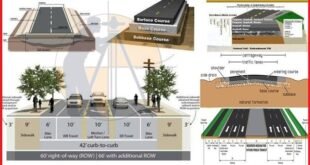Civil Engineering Interview Questions
Hi Civil Engineer, you are on this page because you are attending an interview tomorrow or preparing yourself to face an interview. Well, I am posting the Top interview questions asked by top recruiters from Top MNCs to small construction companies.

Q1. What is the Unit Weight of concrete?
A:- The unit weight of concrete depends on the type of aggregates and the amount of voids. As per IS: 456-200 Unit weight of PCC is 24KN/m3 and RCC is 25KN/m3
Q2. What is the unit weight of Steel?
A. The unit weight of Steel is 78.5KN/m3
Q3. What are the Nominal Concrete Mix proportions for different grades:
A. Important: M20-1:1.5:3, M7.5- 1:4:8,
Less imp: M5- 1:5:10 , M25- 1:1:2, M30-1:1:3 (Cement: Sand: aggregate)
Q4. What is ductility?
A. Ductility is the ability to deform under tensile stress.
Q5. How to find the weight of the steel bar used in reinforcement?
A. Weight of Bar in kg/m = D square /162.2 D- Dia of the bar in mm
Learn More
Civil Engineering Interview Questions and Answers
Q6. What’s the difference between a one-way slab and a two-way slab?
A. One-way slab: Ratio of Longer Span / Shorter span > 2
Two way slab: Ratio of Longer span/ shorter span <= 2
Q7. What is flat slab?
A. The slab which is supported on columns (Flab slab don’t have beams)
Q8. What do you mean by One storeyed, Two storeyed building?
A. The building which has two floors is called a two-storeyed building.
Q9. What’s the height of each floor?
A. 3m
Q10. What’s the length of rise and tread in the Staircase?
A. Rise – 150mm to 200mm, Tread – 250mm to 300mm
Q11. What’s the slope of the Staircase?
A. As per IS 456, the slope or pitch of the stair should be between 25 degrees to 40 degrees.
Q12. What do you mean by the moment of inertia?
A. A quantity expressing a body’s tendency to resist angular acceleration, which is the sum of the products of the mass of each particle in the body with the square of its distance from the axis of rotation.
Q13. What is a crank length in the slab?
A. The crank length in the Slab is 0.42 D. Where D is Depth of Slab- Top cover – Bottom Cover.
Q14. What are the types of slump?
A. True Slump: The concrete mass after the test when slumps evenly all around without disintegration is called the true slump.
Shear Slump: When one-half of the concrete mass slide down the other is called the shear slump. This type of slump is obtained in a lean concrete mix.
Collapse Slump: When the sample is collapsed due to adding excessive water, it is known as a collapse slump.
Zero Slump: For very stiff or dry mixes it does not show any changes in the slump after removing the slump cone.
Q15. What is grouting?
A. Grout is a fluid form of concrete which is used to fill the voids.
Q16. What is the allowable moisture content in Fine aggregate for the concrete mix?
A. We won’t use the aggregate if its moisture content is more than 5%.
Q17. What do you mean by segregation?
A. Segregation is a separation of cement, sand from aggregate. This is caused due to Water cement ratio and when concrete is poured about more than 1.5m
Q18. What is Seepage?
A. slow percolation of water through soil is called Seepage.
Q19. What is the Compressive Strength of brick?
A. Second class brick-70kg/cm2
First class brick-105kg/cm2
Fire brick-125kg/cm2
Q20. How do you check the quality of cement on the site?
A. 1. Date of Mfg: Cement strength decreases with its age.
2. Color: Colour should be grey with a light greenish shade and it should be uniform. Color gives an indication of excess lime or clay.
3. Float test: A good cement won’t float if you throw a cement in water.
4. When you put your hand in a cement bag you should feel cool.
Q21. What is the Initial & final setting time of concrete?
A. Initial Setting time: 30mins, Final setting time: 10hrs
Q22. What is the durability?
A. Ability to withstand under pressure is called Durability.
Q23. What are the concrete tests?
A. Slump test, Compressive strength test, water permeability test, Water absorption test
Q24. What is bleeding in concrete?
A. Bleeding is one form of segregation, where water comes out to the surface of the concrete, being lowest specific gravity among all the ingredients of concrete.
Q25. What is the name of the machine to get the compression test?
A. universal testing machine (UTM)
Q26. When we go to Pile foundation?
A. Pile foundation is adopted when the Soil bearing capacity is less than 24KN/M3
Learn More
-
Calculation Method For Find Out The Overlapping Length Of Beam, Column And Slab
-
Bar Bending Schedule For Slab And Estimation Of Steel Reinforcement In Slab
-
How To Calculate The weight of Steel With Formula
-
How to calculate the cutting length of reinforcement bars in circular R.C.C slab
 Surveying & Architects A unique platform of Civil Engineering
Surveying & Architects A unique platform of Civil Engineering
